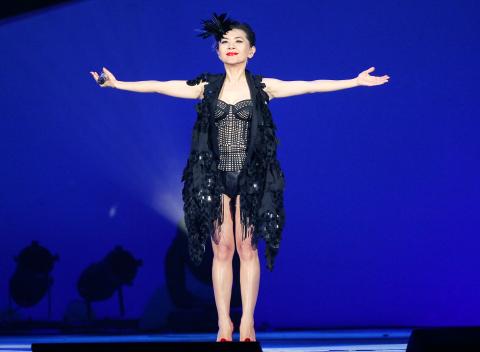The Mando-pop world just can’t get enough of the good ol’ days. Following concerts honoring the 30th anniversary of Rock Records (滾石) last month that featured some 80 performers, 44-year-old Stella Chang (張清芳) returned to the stage for two evenings at the Taipei Arena (台北小巨蛋) last weekend.
Chang was queen of the Mando-pop world in the 1980s and 1990s before she got hitched to investment banker Sung Hsueh-jen (宋學仁) and retired from showbiz in 2005. During her 25-year-long career, the chart-topping singer released 30 albums that sold over 13 million copies in Taiwan, according to the Liberty Times (the Taipei Times’ sister newspaper).
Chang’s return was designed to impress, with NT$7 million (US$235,000) spent solely on seven outfits designed by William Chang (張叔平). The shows were grand and attended by her bigwig buddies including Premier Wu Den-yih (吳敦義), Acer Group founder Stan Shih (施振榮) and Morris Chang (張忠謀), chairman and chief executive of Taiwan Semiconductor Manufacturing Co. Guest appearances included heavyweight celebrities like Carina Lau (劉嘉玲) and Richie Ren (任賢齊).

Photo: Taipei times
Stella Chang and her lavish wardrobe are due to appear on stage in Kaohsiung tomorrow and Taichung on Sunday.
The movie industry isn’t immune from a touch of nostalgia either. Jay Chou (周杰倫) held a press conference in Taipei this week to promote the upcoming film The Green Hornet, which is slated to hit local theaters on Jan. 28. The Chairman stars as Kato, the Hornet’s loyal sidekick played by young Bruce Lee (李小龍) in the 1966 version of the movie.
The linguistically challenged Chou reportedly told gossip journos that one of the high points of making the sci-fi action flick involved the crew complimenting him on the wonderful job he did with shouting “‘huh” and “ha” while filming.
The Asian heartthrob, however, didn’t have much luck building real-life friendships with the film’s hot-shot Hollywood actors. Chou said he made an effort to break the ice with Seth Rogen, who plays the Green Hornet, by talking about cars, but the topic didn’t interest the Canadian actor. Then Chou — an avid fan of magic tricks — pulled out all his routines to try to amuse leading lady Cameron Diaz, but found the actress unimpressed.
Chou couldn’t fathom why he failed to interest Diaz until local media reminded him that one of the Hollywood star’s erstwhile lovers was American illusionist and magician Criss Angel.
“No wonder she knew every one of my tricks,” Chou was quoted as saying.
Perhaps the Mando-pop king has more to worry about than perfecting his magic routines. According to the Apple Daily, Show Luo (羅志祥) beat out Chou and Jolin Tsai (蔡依林) for the first time to become the best-selling singer of the year, with his album Rashomon (羅生門) selling 154,218 copies. Chou came in second with his The Era (跨時代) and S.H.E secured third place with Shero. Tsai, last year’s champion, came in fourth with her Myself 2010, which sold 65,000 copies.
Exhilarated by the news, the newly crowned Luo promised that he would take the 200 employees working at his street-fashion venture on a vacation to Hawaii and dish out very generous yearly bonuses totaling NT$15 million.

Towering high above Taiwan’s capital city at 508 meters, Taipei 101 dominates the skyline. The earthquake-proof skyscraper of steel and glass has captured the imagination of professional rock climber Alex Honnold for more than a decade. Tomorrow morning, he will climb it in his signature free solo style — without ropes or protective equipment. And Netflix will broadcast it — live. The event’s announcement has drawn both excitement and trepidation, as well as some concerns over the ethical implications of attempting such a high-risk endeavor on live broadcast. Many have questioned Honnold’s desire to continues his free-solo climbs now that he’s a

As Taiwan’s second most populous city, Taichung looms large in the electoral map. Taiwanese political commentators describe it — along with neighboring Changhua County — as Taiwan’s “swing states” (搖擺州), which is a curious direct borrowing from American election terminology. In the early post-Martial Law era, Taichung was referred to as a “desert of democracy” because while the Democratic Progressive Party (DPP) was winning elections in the north and south, Taichung remained staunchly loyal to the Chinese Nationalist Party (KMT). That changed over time, but in both Changhua and Taichung, the DPP still suffers from a “one-term curse,” with the

Lines between cop and criminal get murky in Joe Carnahan’s The Rip, a crime thriller set across one foggy Miami night, starring Matt Damon and Ben Affleck. Damon and Affleck, of course, are so closely associated with Boston — most recently they produced the 2024 heist movie The Instigators there — that a detour to South Florida puts them, a little awkwardly, in an entirely different movie landscape. This is Miami Vice territory or Elmore Leonard Land, not Southie or The Town. In The Rip, they play Miami narcotics officers who come upon a cartel stash house that Lt. Dane Dumars (Damon)

Jan. 26 to Feb. 1 Nearly 90 years after it was last recorded, the Basay language was taught in a classroom for the first time in September last year. Over the following three months, students learned its sounds along with the customs and folktales of the Ketagalan people, who once spoke it across northern Taiwan. Although each Ketagalan settlement had its own language, Basay functioned as a common trade language. By the late 19th century, it had largely fallen out of daily use as speakers shifted to Hoklo (commonly known as Taiwanese), surviving only in fragments remembered by the elderly. In